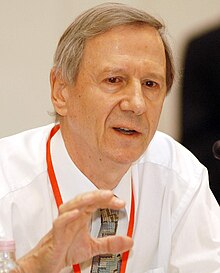Anthony Giddens, Baron Giddens
| Anthony Giddens | |
|---|---|

Giddens in 2004
|
|
| Born |
18 January 1938 London, England |
| Residence | England |
| Nationality | British |
| Fields | Sociology |
| Institutions | |
| Alma mater | |
| Known for | |
| Influences | |
| Influenced | |
Anthony Giddens, Baron Giddens (born 18 January 1938) is a British sociologist who is known for his theory of structuration and his holistic view of modern societies. He is considered to be one of the most prominent modern sociologists, the author of at least 34 books, published in at least 29 languages, issuing on average more than one book every year. In 2007, Giddens was listed as the fifth most-referenced author of books in the humanities.
Four notable stages can be identified in his academic life. The first one involved outlining a new vision of what sociology is, presenting a theoretical and methodological understanding of that field, based on a critical reinterpretation of the classics. His major publications of that era include Capitalism and Modern Social Theory (1971) and The Class Structure of the Advanced Societies (1973). In the second stage Giddens developed the theory of structuration, an analysis of agency and structure, in which primacy is granted to neither. His works of that period, such as New Rules of Sociological Method (1976), Central Problems in Social Theory (1979) and The Constitution of Society (1984), brought him international fame on the sociological arena. The third stage of Giddens's academic work was concerned with modernity, globalisation and politics, especially the impact of modernity on social and personal life. This stage is reflected by his critique of postmodernity, and discussions of a new "utopian-realist"third way in politics, visible in the Consequences of Modernity (1990), Modernity and Self-Identity (1991), The Transformation of Intimacy (1992), Beyond Left and Right (1994) and The Third Way: The Renewal of Social Democracy (1998). Giddens' ambition was both to recast social theory and to re-examine our understanding of the development and trajectory of modernity.
In the most recent stage, Giddens has turned his attention to a more concrete range of problems relevant to the evolution of world society – environmental issues, focussing especially upon debates about climate change, analysed in successive editions of his book, The Politics of Climate Change (2009); the role and nature of the European Union in Turbulent and Mighty Continent: What Future for Europe? (2014); and, in a series of lectures and speeches, the nature and consequences of the digital revolution.
...
Wikipedia
